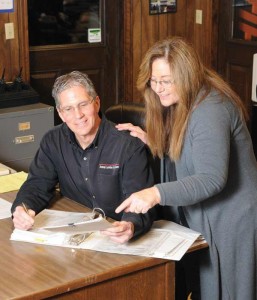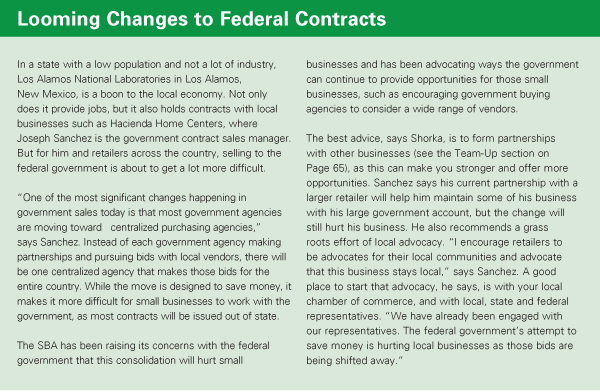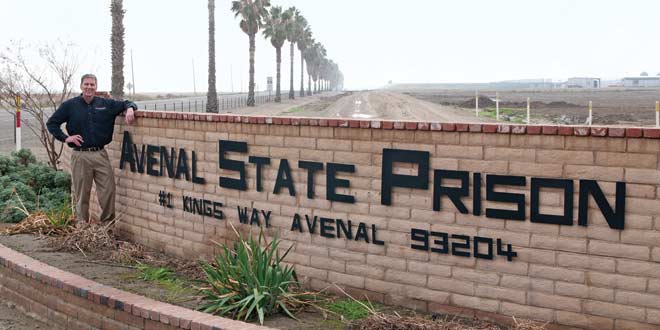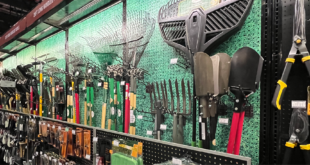To view a PDF of the story, click here.
Breaking In
In the early 1980s, residents of Avenal, California, made what may have seemed like an unusual petition to their state government. The state was making plans to build one of the largest prisons in the nation. And Avenal residents wanted it in their city.
For Ron Moran, owner of Avenal Lumber and Hardware, the request made perfect sense. His town’s local economy was struggling. A prison would bring jobs and, for retailers like himself, new customers. Ron knew that diversifying his business beyond its current customer base would help him remain profitable.
Today, 28 years later, Avenal has the distinction of being the first town to ask its state for a prison, and now, Moran goes to the prison nearly every day with a delivery.
Moran is one of many retailers across the country who find lucrative customers in government agencies, whether it is at the local, state or federal level. Every government facility, whether it’s a prison, a school or the county courthouse, needs to be maintained, and many of the products they need are already right in the aisles of your store. It’s likely that every town, including yours, has some type of government agencies in need of your merchandise. These agencies collectively spend billions of dollars a year buying goods and services.
So how do you start selling to the government? Hardware Retailing spoke to three retailers who are well-acquainted with this unique customer base and asked for their strategies for getting and keeping government customers. If you’re willing to put in the work, the rewards can add up, and a trip to the prison might mean a trip to the bank.

Getting Started
While selling to the government can be rewarding, getting started takes a bit of work. There’s no one-size-fits-all formula for how to get the business. Each agency will vary in its requirements for suppliers, but generally, there are a few key steps you need to follow.
Get Certified
One of the first steps to landing a contract with the government is to obtain proper certification for your business. This step verifies that you are indeed a small business, which will be beneficial to you later. The process is fairly simple, and a good place to start is on the Small Business Administration (SBA) website, www.sba.gov. There are three acronyms you need to know.
• SAM: The System for Award Management refers to a database that contains all the vendors that sell to the government. Registration in this database is free and voluntary, but typically required if you want to do business with the federal government. Through this website, you’ll also register the types of products you can provide, which will aid government agencies who may be searching for vendors. You can visit www.sam.gov for more information.
• DUNS: You’ll also need a Dun & Bradstreet D-U-N-S® number. This is a unique, nine-digit identification number for each physical location of your business. It’s free and easy to register. Visit www.dnb.com for more information.
• NAICS: It may also be helpful to find the NAICS, or North American Industry Classification System, code for your company. This code helps the government classify your business according to its function. Hardware stores are generally classified under 444130, but check the list at www.census.gov to see if any other codes apply to you.
Even if the government agency you’ve started working with doesn’t require a certification, chances are they may soon. It’s best to get the proper certifications up front so you don’t lose a customer later when the requirements change.
Know Your Small Business Benefits
According to the SBA’s website, the federal government buys nearly $100 billion in goods and services from small businesses each year. With his sales to the prison, Moran gets a piece of that. He started by getting a certification with the State of California as a microbusiness, a classification of a small business. As a result, he has certain benefits when it comes to obtaining government contracts.

“California tries to help small businesses by providing a vehicle for them to be a part of the bid process,” he says. “For each bid a government agency puts out, there has to be at least one small business in that bid and I have a 5 percent bid preference on certain bids against larger companies.” That means his bid could be up to 5 percent higher than his competitor, and he could still win the bid.
The state also has a goal of spending at least 25 percent of its dollars with small businesses. And those benefits for small businesses are not limited to California—similar requirements extend to all states and all levels of government.
The “Small Business Set Aside” is a term used to describe goals the federal government has for setting aside money for small businesses. In addition to the SAM certification discussed above, small businesses can be certified according to several certification programs, including businesses owned by women, minorities or disabled veterans, or those in certain business development zones.
“Many of those government agencies at the federal and state level have requirements for doing a certain percentage of their business with small businesses,” says Joseph Sanchez, government sales contract manager for Hacienda Home Center in Albuquerque, New Mexico. “If you can identify yourself as one of those groups, and get certified as such, then that will help you in the bid process.”
The popular buy-local movement also can help your cause, especially when the government agency sees an opportunity for positive public relations. “In our case,” says Moran, “the prison wants as much good PR as they can get, so if they buy a lot from local small businesses, they see that as a feather in their cap to showing they’re friendly toward the community.”
Prepare for Paperwork
“Every bid I write for the prison requires about 13 forms,” says Moran. Some government agencies

require a mountain of paperwork for every transaction, with forms documenting satisfaction of a number of government requirements. For example, one form might confirm that the products are being purchased from a drug-free workplace, or another might indicate that products sold contain a certain amount of recycled content.
Moran has a team of two or three of his seven employees who help him with all of that paperwork, and 70 percent of the forms are submitted via email. Some days, he gets as many as 15 bid requests, and he typically bids on all of them. Some bids take 20 minutes to finish; others take four or five days, depending on the amount of research he has to do to source the product.
Not every contract with the government will require that much paperwork. But even if it’s a large bid (Sanchez recently filled out a bid that, after all of the necessary documentation was finished, totaled 100 pages), don’t be daunted by the amount of time it may take to fill out a proposal. Staying organized will ease the process and the payoff is usually worth the paperwork.
Contact the SBA
One of the best ways to get started selling to government accounts is to contact your local Small Business Administration office or log on to www.sba.gov. In addition to helping with the certifications discussed earlier, the site is full of entry-level information about working with the government.
“Selling to the government is entirely different than selling to the private sector,” says John Shorka, associate administrator for the office of government contracting and business development at the SBA. “You have to do your research to find who’s buying what you’re selling. Doing all of that research can be daunting, but the truth is there are a lot of free resources out there that can help.”
The SBA website offers free courses in its Government Contracting Classroom to help anyone understand the basics of selling to the government. Shorka also recommends retailers seek out a mentor to help them learn the contracting process. Through the SCORE program, the SBA offers volunteer business counselors, free, to those who want to start or build their business. Go to www.score.org for more information.
Selling Strategies
Once you begin working with a government entity, you maintain that business much the way you maintain other business relationships. Here are strategies to leverage the advantages you have as an independent retailer.
Look Everywhere for Ideas
Just about every town has some type of government agency, and each agency can represent not just one, but many potential customers. Sanchez and his sales team work with and call on multiple departments in the Los Alamos National Laboratories, but they work directly with the contracting office to respond to RFPs and address contract issues.
Joey Borski and Lynette McGary at Al’s Hardware in Houston, Texas, work with a local school district. Even within the same school, there may be several different people across several departments that have different needs, and they deal with each person separately. They sell weed trimmers and marking paint to the stadium, padlocks to the school’s event center, and tools and drill bits to the maintenance crew. Each department has its own unique purchasing procedures, whether it’s through a bid or a standing purchase order account at the store.
“Each department within the school acts as its own entity, and we work with each as an individual department,” says McGary. “Each one operates a little differently as to how they want to buy.”
All employees can look for opportunities, too. “When anyone walks into our store, our employees know to start asking them where they are working today and if there’s a way we can do business with them,” says Moran. “We’re also not afraid to go out and knock on doors to find new business.”
Get to Know Everyone in the Department
Just as there may be more than one department involved in purchasing, there may be multiple people in the department authorized to buy. There are plenty of cases where government employees may need an item not included on a regular contract, and their store of choice will be where they know and trust the people behind the sales counter.
“It’s good to know the top guys in the department, but get to know the workers, too,” says Borski. “If there’s an emergency and they need a product right away, they’re going to the place where they have a relationship, even if their bid is at another place. We’re surrounded by competitors that have open bids with the schools, but we treat our customers well, so we get a lot of their walk-in business.”
Many times, individuals in each department are responsible for buying their own products, so the more people you know, the more opportunities you have for the sale.
In addition, when any of those employees move to a different department, or to a completely different government agency, they’ll stay loyal to your business as a result of the good relationship you’ve built.

Emphasize Your Customer Service
Don’t get so buried in the paperwork that you forget the personal side to the business. Remember that while the lowest price wins bids, customer service wins walk-in trade. Many of your competitors may be national distributors who are not likely to match your level of customer service.
Simple communication goes a long way to creating loyal customers.
“We try to communicate frequently with our customers,” says Moran. “We always give them a call or a text to tell them the status of their order and when we’re ready to deliver.”
When a customer needs a special item, his employees are trained never to say no and try to help. “We try to sell them whatever they ask for,” he says. “We’ve sold everything from ink pens and envelopes to building materials. Once, we sold 50 steam irons.”
Convenience is another benefit you can leverage against commercial distributors. With quick delivery, local stores can provide for the daily needs of the institution better than a large company can.
Diversified Orders Help You Win Business
Government agencies may purchase from many vendors, including specialty stores and industrial distributors. As a hardware store and lumber retailer, Moran says one of his strengths is being able to sell a diverse array of items on a single bid. For example, while a specialty paint store may only be able to provide paint, Moran can fill an order that includes paint along with fasteners, lumber and concrete. That gives him the flexibility to bid on nearly every job that comes across his desk, especially since he has quick access to a wide variety of items through his distributor.
Bids Are Good, But So Are P.O.s
Doing business with government through walk-in customers has other benefits, too. At Al’s Hardware, Borski and McGary do a lot of business with the school through purchase orders (P.O.s). While there’s no guarantee of selling a long list of items, as a bid would secure, there’s an opportunity for a better price.
“We make more money on purchase orders versus the bids, where we have to lock in at a certain price,” says McGary. Her walk-in government customers are less likely to compare prices on a P.O. than they are on a bid.
Also be aware of how purchase orders can affect your cash flow. While McGary mails out the monthly statement, she says the accounts payable department at the school may not pay much attention to it until their workers turn in their invoices. That can create a delay past the standard 30 days collection period. “We’ve found it’s best to email invoice reminders,” she says. “If you stay on top of them, they will pay faster.”
Team Up
There is strength in numbers when it comes to winning large government contracts. “One big mistake I see small businesses make is that they try to go at it alone,” says Shorka. He recommends small businesses become sub-contractors for larger businesses or team up with other small businesses to pursue larger contracts. “Teaming up with a larger business is a great way to learn the ropes of government contracts. And sometimes the acquisition packages are larger than a small business could handle on its own.”
Sanchez knows a larger company’s buying power will improve his chances of getting large contracts, so he formed a partnership with Grainger. It’s a win-win for both of them. “Many times, a large company like Grainger needs a smaller, local company like ours to go after large contracts, since we can provide local support and flexibility to those government agencies. We maintain our individuality, but we’re staying aware of our opportunities.”
 Hardware Retailing The Industry's Source for Insights and Information
Hardware Retailing The Industry's Source for Insights and Information








